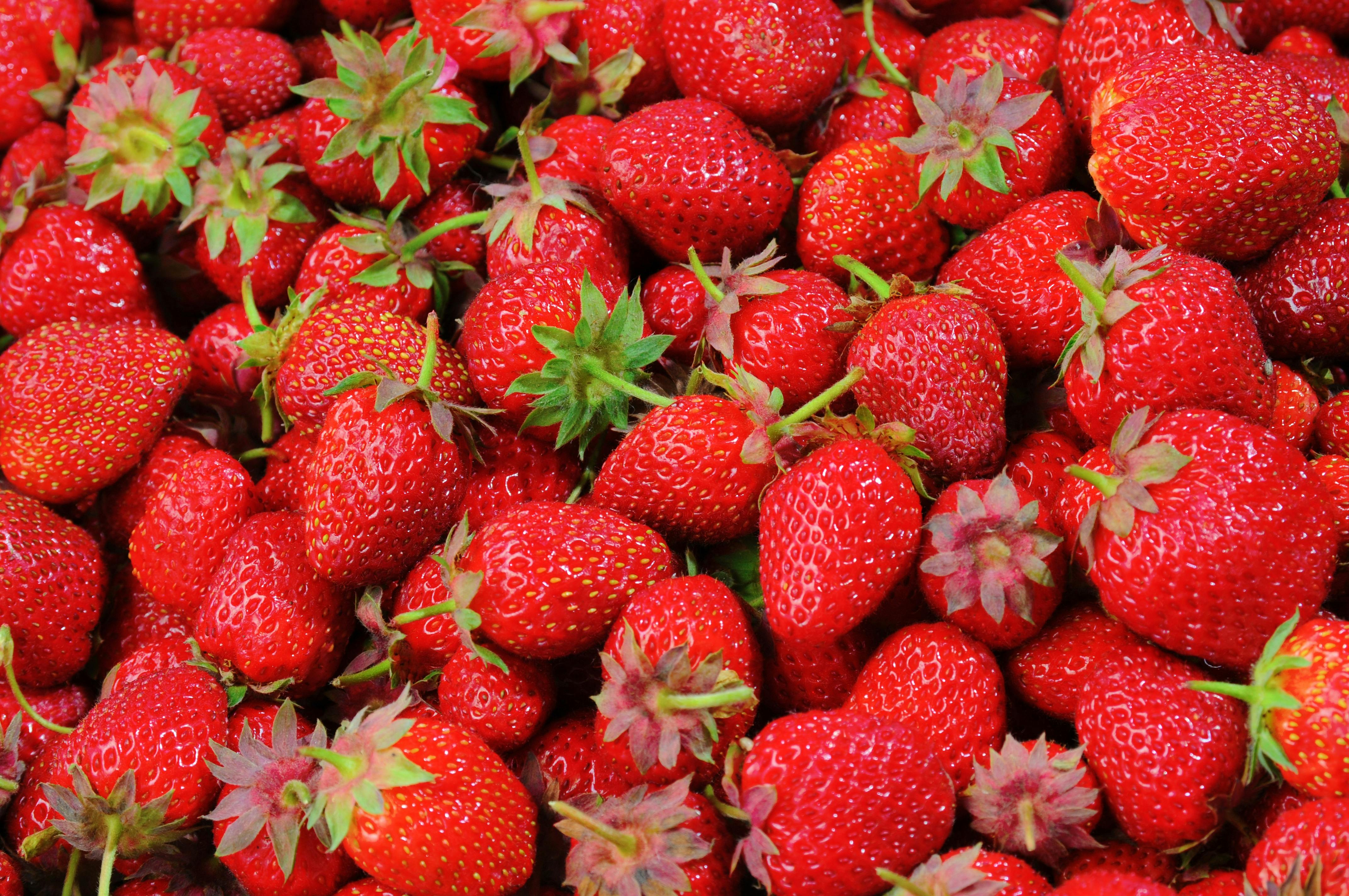Organic strawberries are known for their high quality and delicious taste. But many people are concerned about whether they contain any pesticides. This article will look at the use of pesticides on organic strawberries and whether or not they contain any residues. We will also discuss the potential health risks associated with eating organic strawberries with pesticide residues, as well as ways to reduce your exposure to these substances.Pesticides are chemical substances used to control, destroy, or repel pests such as insects, rodents, fungi, and weeds. They are used agriculturally to protect crops from damage caused by pests and enhance crop yields. Pesticides also may be used in households to control pests such as ants, cockroaches, and bedbugs.
Does Organic Strawberries Contain Pesticides?
Organic strawberries are grown without the use of synthetic fertilisers, pesticides or other chemicals. While organic farming techniques can reduce the amount of pesticides used in strawberry production, they cannot completely eliminate them. Organic farmers are allowed to use certain organic-approved pesticides and other materials as a last resort to control pests and diseases. Although these materials are not synthetic, they may still have an impact on the environment and human health.
Organic strawberries must meet strict standards set by national organic certifying bodies and must be grown without the use of synthetic pesticides, fertilisers or other prohibited substances. However, it is important to note that organic farmers may still use some approved agricultural chemicals such as copper sulfate, sulfur or insecticidal soaps to control pests and diseases. These chemicals are considered ‘natural’ but may still have an environmental impact when used in large quantities.
In addition to approved agricultural chemicals, organic farmers may also apply natural substances such as compost teas or beneficial insects to help reduce pest pressure and improve soil health. These methods are often more effective than chemical-based solutions as they work in harmony with nature’s natural systems. However, even these natural methods can have adverse effects on the environment if used incorrectly or in excessive amounts.
At the end of the day, it is important to remember that no farming system is completely free of pesticides. While organic farming methods can help reduce pesticide use in strawberry production, they cannot completely eliminate them from our food system. It is always best to buy local whenever possible so you can be sure that your food has been grown using sustainable practices that support both human health and environmental protection.
Types of Pesticides Used in Organic Farming
Organic farming is a method of cultivating crops without the use of synthetic pesticides and fertilizers. Instead, organic farmers rely on natural methods and materials to protect their crops from pests and diseases. Some of the most commonly used types of pesticides in organic farming include garlic, sulfur, neem oil, soap sprays, and biological control agents such as ladybugs and parasitic wasps.
Garlic is an effective natural pesticide that can be used to control a variety of pests, including aphids, caterpillars, slugs, beetles, and even some fungal diseases. Garlic can be used either as a spray or in the form of garlic water or garlic oil. The active ingredients in garlic are sulfur compounds which are toxic to many pests but not harmful to humans or animals.
Sulfur is another type of pesticide that can be used for organic farming. It is useful for controlling powdery mildew and other fungal diseases on plants. Sulfur should only be applied when temperatures are below 85 degrees Fahrenheit to avoid burning the plants. It is also important to note that sulfur can be toxic to some beneficial insects such as bees and butterflies so it should not be applied near flowering plants.
Neem oil is derived from the seeds of the neem tree and has been used as a natural pesticide for centuries. It works by disrupting the life cycle of certain insects such as aphids and whiteflies. Neem oil also contains antifungal compounds which make it useful for preventing fungal diseases on plants.
Soap sprays are another type of pesticide often used in organic farming. These sprays contain detergents which act as insecticides by breaking down the outer protective layer on insects’ bodies causing them to die from dehydration or suffocation. Soap sprays are effective against aphids, mites, mealybugs, thrips, whiteflies and other soft-bodied insects but should not be used on plants with soft foliage as it may cause damage to them.
Finally, biological control agents such as ladybugs and parasitic wasps can also be used in organic farming to control insect pests naturally without using any synthetic pesticides or fertilizers. Ladybugs feed on aphids while parasitic wasps lay their eggs in caterpillars which then hatch into larvae that feed on the caterpillar until it dies.
Nutrition Benefits of Organic Strawberries
Organic strawberries are packed with a variety of essential vitamins and minerals. They are a great source of vitamin C, providing more than 100% of the daily recommended intake in just one cup. They also contain vitamin K, manganese, folate, and potassium. They are also an excellent source of dietary fiber, making them an ideal food for promoting digestive health and regularity. In addition, organic strawberries contain a variety of antioxidants that can help to protect against damage caused by free radicals.
Health Benefits of Organic Strawberries
Organic strawberries provide several health benefits due to their nutrient content. They are an excellent source of antioxidants which can help to reduce inflammation in the body and protect against chronic disease. Studies have shown that regularly consuming organic strawberries may reduce the risk of stroke, heart disease, and certain types of cancer. Additionally, they may help to improve cognitive function and reduce the risk of age-related memory decline.
Organic strawberries can also be beneficial for skin health. Their high vitamin C content helps to promote collagen production which is important for maintaining healthy skin structure and elasticity. The antioxidants found in organic strawberries can also help to protect against damage from environmental pollutants and UV radiation from the sun.
Other Benefits of Organic Strawberries
Organic strawberries have a delicious sweet flavor that makes them a popular choice for desserts such as cakes, pies, jams and more. They are also very versatile when it comes to cooking; they can be added to salads or smoothies or used as a topping on yogurt or oatmeal. Additionally, they can be used in savory dishes such as sauces or as part of marinades or dressings.
Organic strawberries are relatively easy to grow at home if you have access to land where you can plant them. Growing your own organic produce is a great way to save money while still enjoying healthy fruits and vegetables without the use of chemicals or additives that may be present in conventional produce options.
How to Identify Organic Strawberries
Organic strawberries are becoming increasingly popular due to their numerous health benefits. To ensure that you are getting the most out of your organic strawberries, it is important to be able to identify them. There are a few key characteristics that can help you know for sure if the strawberries you are buying are truly organic.
One of the first things to look for when trying to identify organic strawberries is their color. Organic strawberries tend to have a deeper, darker red hue than conventional ones. The deeper color indicates that they were grown in an environment with plenty of sunshine and warmth, which is essential for producing healthy and flavorful berries.
Another way to determine if your strawberries are organic is by examining the texture. Organic strawberries will usually be firmer and less mushy than conventional ones as they were grown without the use of any synthetic fertilizers or pesticides. This makes them ideal for baking, freezing, or using in other recipes where softer berries may not be suitable.
The size of the strawberry can also be an indication of whether it is organic or not. Organic strawberries tend to be smaller than conventional varieties due to their lack of synthetic growth hormones. The small size does not affect their flavor however; they are just as sweet and delicious as larger berries!
Finally, you should always check the labels on any produce you purchase before purchasing it. If it says “certified organic” then you know that the product was grown without using any synthetic fertilizers or pesticides and is therefore safe for consumption.

How to Avoid Pesticide Residue on Strawberries
Strawberries are a delicious fruit that can be enjoyed fresh, frozen, or in a variety of recipes. Unfortunately, some of the strawberries we eat may contain traces of pesticides. Pesticides are chemicals used to protect crops from pests and can remain on fruit even after being washed or peeled. To reduce your exposure to pesticide residue, it is important to take steps to avoid it.
First, buy organic strawberries whenever possible. Organic farming practices exclude the use of synthetic pesticides and fertilizers, so it is the safest way to ensure that the strawberries you buy are free from pesticide residue. It is also important to buy local strawberries when possible, as they have shorter distances between farm and store and therefore less time for potential exposure to pesticides.
Another way to reduce your exposure is by washing your strawberries before eating them. This will help remove any remaining traces of pesticide residue from the surface of the fruit. For best results, fill a large bowl or sink with cold water and soak the strawberries for several minutes before rinsing them off with a clean cloth or produce brush.
Finally, if you can’t find organic or locally grown strawberries, you can still reduce your exposure by choosing those with fewer pesticide residues. Look for fruits without signs of damage such as brown spots or cracks which may increase their chances of containing pesticide residues. You can also buy frozen strawberries as they tend to have fewer residues than fresh ones since they are usually processed soon after harvest and frozen quickly before any potential contamination has had time to occur.
By following these simple steps, you can enjoy delicious and safe strawberries without worrying about potentially harmful chemical residues!
Effects of Pesticide Residue on Health
Pesticides are widely used in agriculture to protect crops from pests, weeds, and diseases. Unfortunately, pesticide residues can remain on crops after harvest and may end up in our food. While there is still much debate about the health effects of these chemicals, research suggests that exposure to pesticide residues can be hazardous to health.
The primary concern with pesticide residue is that it can contain toxins which may be absorbed by the body when consumed. These toxins can accumulate in the body over time and lead to a variety of health problems. Some of the potential consequences include neurological damage, cancer, endocrine disruption, reproductive problems, and organ damage. In particular, children are particularly vulnerable to the effects of pesticides due to their developing bodies.
The long-term effects of exposure to pesticide residues are still unknown as further research is needed in order to determine their exact impact on human health. However, it is recommended that people reduce their exposure to pesticide residues by buying organic produce whenever possible and washing all fruits and vegetables before consumption. Additionally, people should avoid using pesticides around their homes or gardens as this can also increase their risk of exposure to these toxic chemicals.
Organic vs. Conventional Strawberries
Strawberries are a popular and nutritious fruit that is enjoyed by many. It can be difficult to decide which type of strawberry to purchase, organic or conventional.
Organic strawberries are grown without the use of chemical fertilizers, pesticides, or herbicides. They are usually grown in smaller farms and require more manual labor than conventional strawberries, making them more expensive. Organic strawberries also tend to be smaller in size than conventional strawberries and often have a shorter shelf life.
Conventional strawberries are grown using synthetic fertilizers, pesticides, and herbicides to promote growth and reduce pests. These chemicals may increase the yield and size of the fruit, but they can also cause potential health hazards if consumed in large amounts. Conventional strawberries tend to be larger in size and have a longer shelf life compared to organic strawberries due to the use of chemicals.
When choosing between organic or conventional strawberries, it is important to consider your own preferences as well as the potential health risks associated with consuming conventionally-grown fruits and vegetables. Organic strawberries may be more expensive but they are free from potentially harmful chemicals that could affect your health over time.

Conclusion
Organic strawberries are a great option for those looking to avoid the potential health risks associated with conventional strawberries. While it is impossible to guarantee 100% pesticide-free strawberries, organic farmers and suppliers take various measures to reduce the use of pesticides while still producing high-quality fruit.
In addition, organic farmers focus on sustainable methods of growing and harvesting fruit, which can help the environment in a variety of ways. Although organic strawberries may cost more than conventional ones, their health benefits could be worth the extra expense for many people.
Overall, organic strawberries are a great alternative for people who want to enjoy the delicious taste of this popular fruit without worrying about exposure to potentially harmful pesticides.



